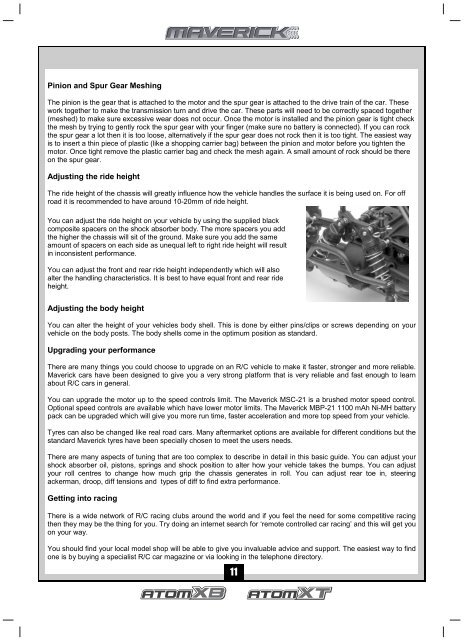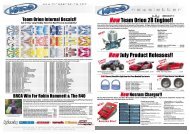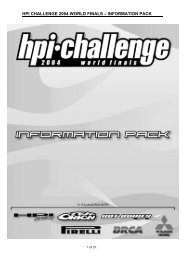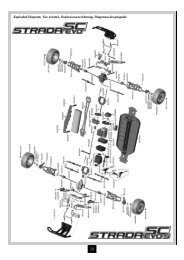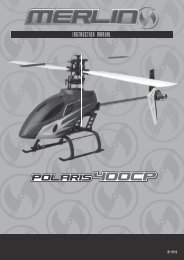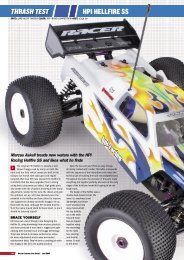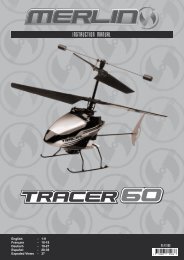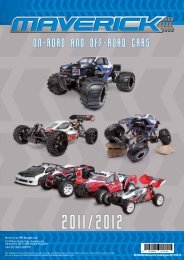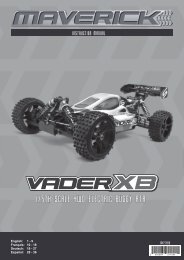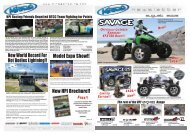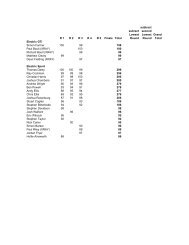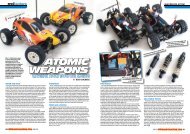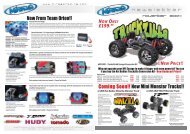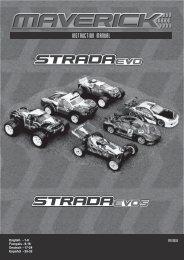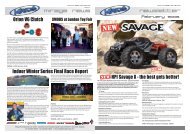Atom Manual EU Ver 2.pub - LRP
Atom Manual EU Ver 2.pub - LRP
Atom Manual EU Ver 2.pub - LRP
You also want an ePaper? Increase the reach of your titles
YUMPU automatically turns print PDFs into web optimized ePapers that Google loves.
Pinion and Spur Gear Meshing<br />
The pinion is the gear that is attached to the motor and the spur gear is attached to the drive train of the car. These<br />
work together to make the transmission turn and drive the car. These parts will need to be correctly spaced together<br />
(meshed) to make sure excessive wear does not occur. Once the motor is installed and the pinion gear is tight check<br />
the mesh by trying to gently rock the spur gear with your finger (make sure no battery is connected). If you can rock<br />
the spur gear a lot then it is too loose, alternatively if the spur gear does not rock then it is too tight. The easiest way<br />
is to insert a thin piece of plastic (like a shopping carrier bag) between the pinion and motor before you tighten the<br />
motor. Once tight remove the plastic carrier bag and check the mesh again. A small amount of rock should be there<br />
on the spur gear.<br />
Adjusting the ride height<br />
The ride height of the chassis will greatly influence how the vehicle handles the surface it is being used on. For off<br />
road it is recommended to have around 10-20mm of ride height.<br />
You can adjust the ride height on your vehicle by using the supplied black<br />
composite spacers on the shock absorber body. The more spacers you add<br />
the higher the chassis will sit of the ground. Make sure you add the same<br />
amount of spacers on each side as unequal left to right ride height will result<br />
in inconsistent performance.<br />
You can adjust the front and rear ride height independently which will also<br />
alter the handling characteristics. It is best to have equal front and rear ride<br />
height.<br />
Adjusting the body height<br />
You can alter the height of your vehicles body shell. This is done by either pins/clips or screws depending on your<br />
vehicle on the body posts. The body shells come in the optimum position as standard.<br />
Upgrading your performance<br />
There are many things you could choose to upgrade on an R/C vehicle to make it faster, stronger and more reliable.<br />
Maverick cars have been designed to give you a very strong platform that is very reliable and fast enough to learn<br />
about R/C cars in general.<br />
You can upgrade the motor up to the speed controls limit. The Maverick MSC-21 is a brushed motor speed control.<br />
Optional speed controls are available which have lower motor limits. The Maverick MBP-21 1100 mAh Ni-MH battery<br />
pack can be upgraded which will give you more run time, faster acceleration and more top speed from your vehicle.<br />
Tyres can also be changed like real road cars. Many aftermarket options are available for different conditions but the<br />
standard Maverick tyres have been specially chosen to meet the users needs.<br />
There are many aspects of tuning that are too complex to describe in detail in this basic guide. You can adjust your<br />
shock absorber oil, pistons, springs and shock position to alter how your vehicle takes the bumps. You can adjust<br />
your roll centres to change how much grip the chassis generates in roll. You can adjust rear toe in, steering<br />
ackerman, droop, diff tensions and types of diff to find extra performance.<br />
Getting into racing<br />
There is a wide network of R/C racing clubs around the world and if you feel the need for some competitive racing<br />
then they may be the thing for you. Try doing an internet search for ‘remote controlled car racing’ and this will get you<br />
on your way.<br />
You should find your local model shop will be able to give you invaluable advice and support. The easiest way to find<br />
one is by buying a specialist R/C car magazine or via looking in the telephone directory.<br />
11


